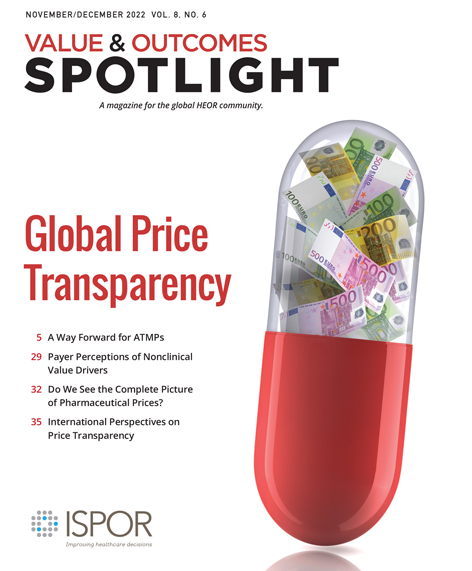Making an Impact: ISPOR Outstanding Chapter Award 2022
An Interview With the ISPOR 2022 Outstanding Chapter Award Winners: Shanghai, Slovakia, and Argentina Chapters
The ISPOR Outstanding Chapter Award program recognizes ISPOR regional chapters’ outstanding contribution and leadership in advancing ISPOR’s mission in global regions: Asia Pacific, Latin America, and Europe, Middle East, and Africa. The ISPOR Shanghai, Slovakia, and Argentina chapters have been recognized for their exemplary achievements in advancing health economics and outcomes research (HEOR) in their regions. This award is based on a thorough review of chapters’ impact on HEOR and health policy in their regions through activities, including education, research and engagement, and contribution to ISPOR strategic initiatives, as described in their annual reports.
LARGE-SIZED CHAPTER

Wen Chen, PhD
President, ISPOR Shanghai Chapter
Fudan University, China
What is something that you are really proud of your chapter for and why? What lessons can other chapters learn from the ISPOR Shanghai chapter?
One of the most important attributes of the Shanghai chapter is that we work closely with policy development and implementation, therefore, our work can directly contribute to supporting decision making. Members in the Shanghai chapter have actively participated in pharmacoeconomic/health technology assessment (PE/HTA) appraisal for the national health insurance negotiation with manufacturers and served on the PE Expert Panel to provide technical support for the update of the National Reimbursement Drug List. Given this intrinsic feature, I am proud that the Shanghai chapter has provided a platform for both scholars and policy makers to communicate and exchange opinions.
As a regional chapter, it is important to create an environment to encourage active engagement in both scientific research and the policy-making process—from value dissemination to daily communication.
How would the chapter use being the recipient of this award to improve healthcare decision making in China?
This award is an outstanding recognition of the efforts made by our team and chapter members and has been very motivating for me and the Shanghai chapter. Although we are still facing enormous challenges during the pandemic, the chapter will continue to facilitate a growing awareness of HTA in China and commit to evolving scientific activities and policy-related activities, participating in relevant conferences and virtual meetings, and organizing more educational training sessions.
According to the chapter, what HEOR trends do you think are the most relevant and most important to focus on? How do you see the future of HEOR evolving in your region?
HEOR is booming in China. We now have the China Guidelines for Pharmacoeconomic Evaluations published and the process of PE/HTA appraisals during national health insurance negotiation. With the flourishing growing trend in China, we expect and call for more practical and operational instructions being released to guide the HTA practice in China.
As HEOR is becoming more commonly used in the field of healthcare and related decision making, a strong talent team with expertise in HEOR will be needed and there will be more HEOR work that needs to be conducted locally. We are positive about the future of HEOR and will focus more on talent building through educational activities and communications between scholars and policy makers.
MEDIUM-SIZED CHAPTER

Lucia Hlavinkova, PhD
President, ISPOR Chapter Slovakia
NovoNordisk, Slovakia
Tell us what this award means for the Chapter and your country?
We see this award as a great recognition that we are doing the right things at the right time and in the right place. It is very motivational for us and gives us the energy and enthusiasm to continue our endeavors to further improve the level of the pharmacoeconomics in Slovakia.
The ISPOR Chapter Slovakia was originally established as a strong expert community 15 years ago. The chapter has entered its era as an institutionalized organization with solid scientific foundation since 2014 under leadership of Mária Bucek Pšenková, MPH, MSc (HTA), currently past-president of the chapter. This award is an appreciation of the long-term efforts of ISPOR Slovakia and obliges us to continue to support and further improve decision making in healthcare in Slovakia.
According to the chapter, what HEOR trends do you think are the most relevant and what’s important to focus on? How do you see the future of HEOR evolving in your region?
In our region, we most often encounter healthcare systems that are financially undersized. For this reason, in order not to perceive innovation as only a cost driver, it is necessary to prove and quantify benefits of innovation and talk about it. While costs might only appear as a simple expression of the amount of money per unit, they should in fact be seen as incremental costs over existing costs spent. At the same time, these costs range from direct medical costs, through socioeconomic costs, to social costs. On the benefits side, its measurement and quantification are even more complex. It is therefore necessary that methodologies and approaches to measure costs as benefits in healthcare continue to be developed and implemented in regional and national decision-making processes. We want to maintain our efforts in building high-quality, evidence-based HTA standards, as this allows payers to make good, informed, and sustainable decisions for patients and society as a whole.
What contributions have the chapter made in HEOR and healthcare decision making that are most meaningful to you?
In February 2022, the ISPOR Chapter Slovakia published the second edition of local pharmacoeconomics guidelines, which was created as an update of the guidelines issued in December 2020. Historically, the first edition of the Slovak pharmacoeconomic guidelines of professional societies was developed as a response to a broad demand for methodological recommendations that would consider current international trends in the pharmacoeconomics, as well as guidelines of international professional societies. The first edition receiveda positive response from the professional community. Pharmacoeconomics is a dynamic and rapidly evolving scientific discipline. After just over a year, our chapter helped develop the second edition of the guidelines, which has been supplemented by new knowledge and sources of information, including ISPOR’s updated Consolidated Health Economic Evaluation Reporting Standards, CHEERS 2022. Most importantly, decision makers are now aware that approaches to health economic evaluation need to be updated and the latest knowledge incorporated into real-world practice.
SMALL-SIZED CHAPTER

Olga Andrea Alcaraz, MSc, PhD, MD
President, ISPOR Argentina Chapter
Instituto de Efectividad Clínica y Sanitaria
Argentina
According to the chapter, what HEOR trends do you think are the most relevant, and what’s important to focus on? How do you see the future of HEOR evolving in your region?
The use of real-world evidence is projected as one of the growing interests in the region. It is crucial that progress on this topic be made with the highest quality possible and join efforts to establish reliable sources of information. It will also be necessary to discuss the feasibility of using the data generated in decision making to incorporate new technologies.
On the other hand, the high cost of new technologies continues to be a critical problem in the region. Establishing clear rules regarding cost-effectiveness and budget impact thresholds is essential to have clear rules. This could favor improving the judicialization of health—a very important topic in the region.
What contributions have the chapter made in HEOR and healthcare decision making that are most meaningful to you?
The chapter tries to position itself as a space for dialogue between the different decision-making stakeholders for the incorporation of health technologies in Argentina. During the past year, we worked on the issue of joint venture agreements, where this interaction is critical for the success of the chapter. A webinar was held to raise awareness about collaboration possibilities and a survey was sent to understand the barriers and facilitators for its implementation. A workshop is planned to establish priorities for action.
Going forward, do you have any goals as an ISPOR chapter president? What has been your biggest challenges and lessons learned from this role?
The greatest personal challenge is to facilitate the dialogue of all the actors in the health system who sometimes have time limitations or certain resistance to the discussion. Coming from an academic background, I try to leave that imprint on my activity in the chapter. We are lucky to have a very interdisciplinary chapter, where we have different professions and fields of work, which significantly enriches the discussions and projects. Being that this is a small chapter, maintaining active participation with a stable position in the country is my main objective as a chapter president.

